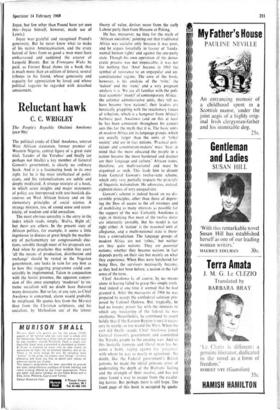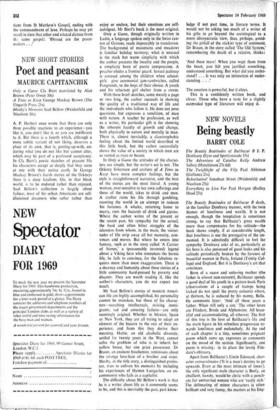Reluctant hawk
C. C. WRIGLEY The People's Republic Obafemi Awolowo (ouP 90s)
The political credo of Chief Awolowo, veteran West African statesman, former premier of Western Nigeria, central figure of a great state trial, `Leader of the Yorubas' and finally (or perhaps not finally) a key member of General Gowon's government, is clearly no ordinary book. And it is a fascinating book in its own right, for he is the most intellectual of politi- cians, and his rationalisations are subtle and deeply meditated. A strange mixture of a book, in which acute insights and major statements of policy are interspersed with text-bookish dis- courses on West African history and on the elementary principles of social science. A strange mixture, too, of sound sense and eccen- tricity, of wisdom and wild unrealism.
The most obvious unreality is the entry in the index which reads, simply, 'Biafra, Bight of,' but there are others. In the present state of African politics, for example, it seems a little ingenuous to discuss at great length the machin- ery of parliamentary (or congressional) elec- tions, sensible though most of his proposals are. And when he proclaims that within five years `all the means of production, distribution and exchange' should be vested in the Nigerian government, one looks in vain for any hint as to how this staggering programme could con- ceivably be implemented. Taken in conjunction with the Soviet presence, the apparent conver- sion of this once exemplary 'moderate' to ex- treme socialism will no doubt have fluttered many dovecotes. But so far, at any rate, as Chief Awolowo is concerned, alarm would probably be misplaced. He quotes less from the Marxist than from the Christian scriptures, and' his socialism, by Methodism out of the labour
theory of value, derives more from the early Labour party than from Moscow or Peking.
He has, moreover, no time for the myth of `African socialism,' pointing out that traditional Africa was socialist only because it was poor, and he argues forcefully in favour of 'funda- mental human rights' and against the one-party state. Though his own operation of the demo- cratic process was not impeccable, it was not for nothing that "Awo' became in 1965 the symbol of resistance to an unpopular and un- constitutional regime. The core of the book, however, is his analysis of the 'tribe,' the `nation' and the 'state,' and a very pregnant analysis it is. We are all familiar with the poli- tical scientists' model' of contemporary Africa : the colonial administrative units, they tell us, have become new nations'; their leaders are heroically grappling with the reactionary forces of tribalism, which is a hangover from Africa's barbaric past. Awolowo (and on this at least he has been consistent throughout his career) sees this for the myth that it is. The basic units of modern Africa are its language groups, which are usually larger than the units of 'tribal society' and are in fact nations. 'Practical poli- ticians and constitution-makers' must 'bear in mind that the more educated the people in a nation become the more hardened and distinct are their language and culture.' African states, therefore, are multi-national and must be organised as such. This leads him to dissent from General Gowon's twelve-state scheme, which only very partially respects the principle of linguistic nationalism. He advocates, instead, eighteen states, of very unequal size.
Gowon's scheme is indeed based on no dis- cernible principles, other than those of depriv- ing the Ibos of access to the oil revenues and of mobilising as many interests as possible for the support of the war. Certainly Awolowo is right in thinking that most of the twelve states are inherently unstable. But his model is not right either. A 'nation' is the maximal unit of allegiance, and a multi-national state is there- fore a contradiction. The language groups of modern Africa are not 'tribes,' but neither are they quite nations. They are potential nations; whether they become nations in fact depends partly on their size but mainly on what they experience. When Ibos were butchered for being Ibos, the survivors necessarily became, as they had not been before, a nation in the full sense of the term.
Chief Awolowo is, of course, by -no means alone in having failed to grasp this simple truth. And indeed at one time it seemed that he had grasped it. After the massacres of 1966 he was prepared to accept the confederal solution pro- posed by Colonel Ojukwu. But, tragically, he had no troops; power lay with the interests to which any weakening of the federal tie was anathema. Nevertheless, he continued to assert boldly that if the Eastern Region found it neces- sary to secede, so too would the West. When the east did finally secede, Chief Awolowo joined General Gowon's government and committed the Yoruba people to the ensuing war. And so this basically humane and liberal man has be- come a hawk, raging against the 'gangsters' with whom he was so nearly in agreement. No doubt, like the Federal government's British patrons, he made the initial grievous error of underrating the depth of the Biafrans' feeling and the strength of their resolve, and has not since found a way to escape from the escalat- ing horror. But perhaps there is still hope. The front page of this book is occupied by quota-
lions from St Matthew's Gospel, ending with the commandment of love. Perhaps he may yet recall in time that other and related dictum from the same gospel: 'Blessed are the peace- makers .



































 Previous page
Previous page